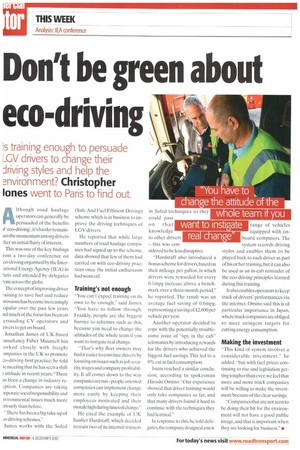Don't be green about eco-driving
Page 20

If you've noticed an error in this article please click here to report it so we can fix it.
Is training enough to persuade LGV drivers to change their driving styles and help the
environment? Christopher Jones went to Paris to find out.
Although road haulage operators can generally be persuaded of the benefits 4 'eco-driving', it's harder to mainam n the momentum among drivers fter an initial flurry of interest. This was one of the key findings rom a two-day conference on co-driving organised by the In terational Energy Agency (IEA) in 'aris and attended by delegates rom across the globe.
The concept of improving driver raining to save fuel and reduce missions has become increasingly °pular over the past few years nd much of the focus has been on ersuading CV operators and rivers to get on board.
Jonathan James of UK-based onsultancy Faber Maunsell has rorked closely with freight Jmpanies in the UK to promote co-driving best practice; he told le meeting that he has seen a shift i attitude in recent years: "There as been a change in industry re2,ption. Companies are taking 3rporate social responsibility and wirontnental issues much more riously than before.
-There has been a big take-up of :o-driving schemes."
James works with the Safed (Safe And Fuel Efficient Driving) scheme which is in business to improve the driving techniques of LG V drivers.
He reported that while large numbers of road haulage companies had signed up to the scheme, data showed that few of them had carried on with eco-driving practices once the initial enthusiasm had worn off.
Training's not enough
"You can't expect training on its own to be enough," said James. "You have to follow through. Frankly, people are the biggest barrier to schemes such as this, because you need to change the attitudes of the whole team if you want to instigate real change.
"That's why fleet owners may find it easier to convince drivers by focusing on issues such as job security,wages and company profitability. It all comes down to the way companies are run—people-oriented companies can implement change more easily by keeping their employees motivated and their morale high during times of change."
He cited the example of UK haulier Hardstaff, which decided to train two of its internal trainers in Safed techniques so they could pass on that knowledge to other drivers — this was considered to be less disruptive.
"Hardstaff also introduced a bonus scheme for drivers, based on their mileage per gallon, in which drivers were rewarded for every 0.1mpg increase above a benchmark over a three-month period," he reported. The result was an average fuel saving of 0.6mpg, representing a saving of £2,600 per vehicle per year.
Another operator decided to cope with the potentially troublesome issue of "spy in the cab" telematics by introducing rewards for the drivers who achieved the biggest fuel savings. This led to a 9% cut in fuel consumption.
Isuzu reached a similar conclusion, according to spokesman Hiroshi Omino: "Our experience showed that driver training would only take companies so far, and that many drivers found it hard to continue with the techniques they had learned."
want to instigate
In response to this, he told delegates,the company designed a new range of vehicles equipped with onboard computers. The system records driving styles and enables them to be played back to each driver as part of his or her training, but it can also be used as an in-cab reminder of the eco-driving principles learned during this training.
It also enables operators to keep track of drivers' performances via the internet. Omino said this is of particular importance in Japan, where truck companies are obliged to meet stringent targets for cutting energy consumption.
Making the investment
" Ellis kind of system involves a considerable investment," he added, "but with fuel prices continuing to rise and legislation getting tougher than ever, we feel that more and more truck companies will be willing to make the investment because of the clear savings.
"Companies that are not seen to be doing their bit for the environment will not have a good public image, and that is important when they are looking for business." •


























































































































































































